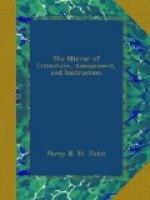At a subsequent general election, as an expensive contest was expected for Northumberland, Mr. Grey declined nomination, and was returned to parliament for Appleby, which borough he represented till his succession to the peerage. In the House of Commons his great talents soon shone forth; and, in conjunction with Fox, Sheridan, Lambton, Ponsonby, and others, he maintained an intrepid opposition to the doctrines of that darling of fame, Mr. Pitt. Immediately after his entrance into Parliament, his discussion of the minister’s important treaty of commerce, may be said to have established his reputation, by the force of his eloquence, as well as by the enlarged views which he seemed to have acquired of commercial relations; which knowledge is more frequently the result of gradual experience than of early attainment.
In these stormy times Mr. Grey ranked among the head and front of contending politics. He was appointed one of the managers of that magnificent political drama—the impeachment of Warren Hastings, when he displayed great acumen in that part of the accusation termed the Benares Charge.
In 1791, we find Mr. Grey taking the lead in a measure, which, in the language of a great orator (Burke) “shed a lustre on the character and humanity of the nation.” The subject to which we allude, was the melancholy situation of those who were unable to satisfy the demands of importunate creditors, and consequently subjected to the operation of a rigorous code of laws. His observation in moving for a parliamentary committee to inquire into the present practice and effect of imprisonment for debt is worthy of quotation: “it was desirable to distinguish the unfortunate debtor from the knavish one, to place the creditor in that situation which afforded the fairest and the speediest means of compensation, and to regulate the jails of this country in such a manner as to prevent unnecessary hardship and restraint. Whether they considered the practice of confining for debt men who had no means of discharging such debt, or, on the contrary, fraudulent debtors, whose creditors by no process could compel them to pay; these circumstances were alone sufficient to constitute an inquiry into the state of the laws relating to debtor and creditor.” This motion being acceded to, a committee consisting of Mr. Grey, Mr. Pitt, Sir John Sinclair, Mr. Vansittart, Mr. Martin, the Attorney and Solicitor Generals, and other legal gentlemen, was immediately appointed. The origin of this inquiry is an indicative of the liberal policy of the statesman as it is of the humanity of the mover.
In 1792, Mr. Grey instituted an inquiry into the conduct of ministers with regard to the recently threatened hostilities with Russia. His animadversion upon the vacillating and ruinous measures of government were characterized by that fearless intrepidity, truth, energy, and eloquence, which have distinguished his political career. The motion for the inquiry was lost, though the powerful remarks of the mover drew from Mr. Pitt the following memorable confession: “All unlimited confidence is unconstitutional; and I hope the inglorious moment will never arrive, when this house will abandon the privilege of examining, condemning, and correcting the abuses in the executive government. It is the dearest privilege you possess, and should never be relinguished.”




